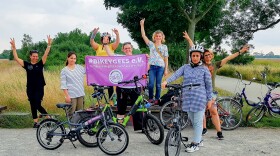
Deborah Amos
Deborah Amos covers the Middle East for NPR News. Her reports can be heard on NPR's award-winning Morning Edition, All Things Considered, and Weekend Edition.
In 2009, Amos won the Edward Weintal Prize for Diplomatic Reporting from Georgetown University and in 2010 was awarded the Edward R. Murrow Lifetime Achievement Award by Washington State University. Amos was part of a team of reporters who won a 2004 Alfred I. duPont-Columbia University Award for coverage of Iraq. A Nieman Fellow at Harvard University in 1991-1992, Amos returned to Harvard in 2010 as a Shorenstein Fellow at the Kennedy School.
In 2003, Amos returned to NPR after a decade in television news, including ABC's Nightline and World News Tonight, and the PBS programs NOW with Bill Moyers and Frontline.
When Amos first came to NPR in 1977, she worked first as a director and then a producer for Weekend All Things Considered until 1979. For the next six years, she worked on radio documentaries, which won her several significant honors. In 1982, Amos received the Prix Italia, the Ohio State Award, and a DuPont-Columbia Award for "Father Cares: The Last of Jonestown," and in 1984 she received a Robert F. Kennedy Journalism Award for "Refugees."
From 1985 until 1993, Amos spend most of her time at NPR reporting overseas, including as the London Bureau Chief and as an NPR foreign correspondent based in Amman, Jordan. During that time, Amos won several awards, including a duPont-Columbia Award and a Breakthru Award, and widespread recognition for her coverage of the Gulf War in 1991.
A member of the Council on Foreign Relations, Amos is also the author of Eclipse of the Sunnis: Power, Exile, and Upheaval in the Middle East (Public Affairs, 2010) and Lines in the Sand: Desert Storm and the Remaking of the Arab World (Simon and Schuster, 1992).
Amos is a Ferris Professor at Princeton, where she teaches journalism during the fall term.
Amos began her career after receiving a degree in broadcasting from the University of Florida at Gainesville.
-
An agreement between Saudi Arabia and Iran to resume diplomatic relations is being assessed for its regional impact as well as how it could affect U.S. influence in the Middle East.
-
A team at Yale University is using open-source materials to document the forced removal of Ukrainian children to Russia. Russia says it's a vast humanitarian program.
-
Rape is considered a war crime, but cases that make it to trials or tribunals are remarkably rare because survivors are traumatized and often feel shame and are reluctant to testify.
-
As Americans wait for a Supreme Court decision on a case that could overturn the 1973 decision that legalized abortion in the U.S., other countries already provide a snapshot of what that's like.
-
The world's first criminal trial on torture in Syria's prisons ended Thursday in Koblenz, Germany — the first time a high-ranking ex-Syrian official faced Syrians in open court in a war crimes case.
-
A U.S. citizen, described as a misfit adventurer, spent years in a Syrian prison and is now suing. At the same time, he's fulfilling the pact he made with his fellow prisoner.
-
German courts and investigators are taking on crimes far beyond their borders — alleged war crimes by ISIS, the Syrian regime and others.
-
They come from countries where the idea of a girl on a bicycle is often taboo. Now a group called Bikeygees is teaching them to master the pedals. For the new riders, it's a lifelong dream come true.
-
A program in Germany teaches refugee women how to ride bikes as a way to build confidence and integrate themselves into a new society.
-
An Israeli demolition last month revived fears among residents of al-Bustan in east Jerusalem's Silwan neighborhood. "Yes, Bustan is going to be demolished for a park," says Jerusalem's deputy mayor.





